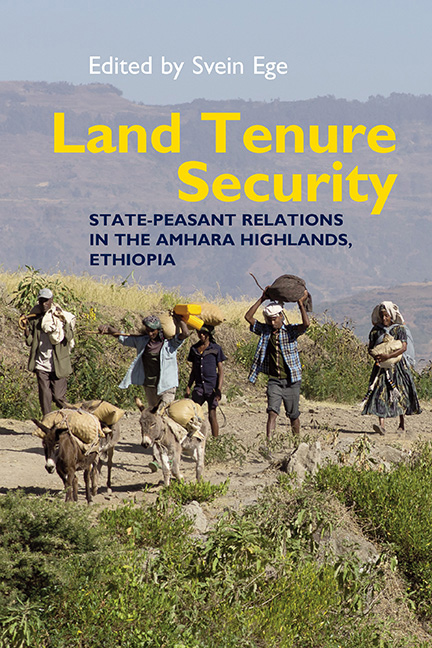Book contents
- Frontmatter
- Dedication
- Contents
- List of Illustrations
- Note on Transliteration
- Dates and Measures
- Contributors
- Preface
- Glossary
- Map
- 1 Introduction
- 2 Peasant Land Tenure: A Critical Review
- 3 The Dersha System: Rethinking Land Tenure under the Därg
- 4 Land Tenure in Gojam under the Därg
- 5 Land Tenure in Baba Säat, North Wälo
- 6 Rich and Poor: Land and Wealth in Mäqét, North Wälo
- 7 Rural Land and Urban Aspirations: Future Orientation in a Time of Change
- 8 An Unstable Land Tenure System
- 9 Conclusion
- Postface
- Select Bibliography
- Index
- Eastern African Studies
6 - Rich and Poor: Land and Wealth in Mäqét, North Wälo
Published online by Cambridge University Press: 26 March 2019
- Frontmatter
- Dedication
- Contents
- List of Illustrations
- Note on Transliteration
- Dates and Measures
- Contributors
- Preface
- Glossary
- Map
- 1 Introduction
- 2 Peasant Land Tenure: A Critical Review
- 3 The Dersha System: Rethinking Land Tenure under the Därg
- 4 Land Tenure in Gojam under the Därg
- 5 Land Tenure in Baba Säat, North Wälo
- 6 Rich and Poor: Land and Wealth in Mäqét, North Wälo
- 7 Rural Land and Urban Aspirations: Future Orientation in a Time of Change
- 8 An Unstable Land Tenure System
- 9 Conclusion
- Postface
- Select Bibliography
- Index
- Eastern African Studies
Summary
INTRODUCTION
In the Amhara highlands, the household is a key economic institution, being the basic unit for production and consumption. It is an autonomous unit, but with numerous links to other households, through kinship, work, and other rights and obligations through formal or semiformal institutions (see Aspen 1993). In the previous chapter, Ege explored the history of land tenure in a rural community in the extreme highlands of North Wälo. In his analysis of Baba Säat, Ege found that the society was remarkably equal, as a result of the 1975 land reform and the 1991 EPRDF land redistribution. In this chapter, the community under investigation is also in North Wälo, but further west and, in contrast to Baba Säat, centrally located along the major highway that connects the community to the big markets in Gojam, Tegray and Addis Ababa.
The topic here is the distribution of key resources and how this affects patterns of relative wealth and poverty in the peasant community, specifically in Jerelé commune. North Wälo, where Baba Säat and Jerelé are located, is the region that became emblematic for Ethiopia as a poor and famine-ridden country, or, as Gill (2010: 3) has expressed it, ‘the iconic poor country’. Wälo was hard hit by the 1984–85 famine, and was for many years afterwards a recipient of international ‘emergency aid’ (cf. Aspen and Ege 2010: 1). Detailed knowledge about the peasants’ rights to and use of land, and the strategies they employ under shifting political, legislative and climatic conditions, stands out as an extremely important prerequisite to combating new crises and the prevailing insecurity and poverty in the northern highlands.
In this chapter, I present a glimpse of how some of these elements are related in survey data collected in North Wälo around 2002. My ambition is to analyze how key resources are distributed in the peasant population and to explore what patterns of relative wealth and poverty can be discerned. I mainly discuss how land, together with a few other key resources related to farming in the northern highlands – in particular manpower and draught power – are distributed between households and how they are managed, in relation to variables commonly used as indicators of productivity and wealth.
- Type
- Chapter
- Information
- Land Tenure SecurityState-peasant relations in the Amhara Highlands, Ethiopia, pp. 98 - 111Publisher: Boydell & BrewerPrint publication year: 2019



